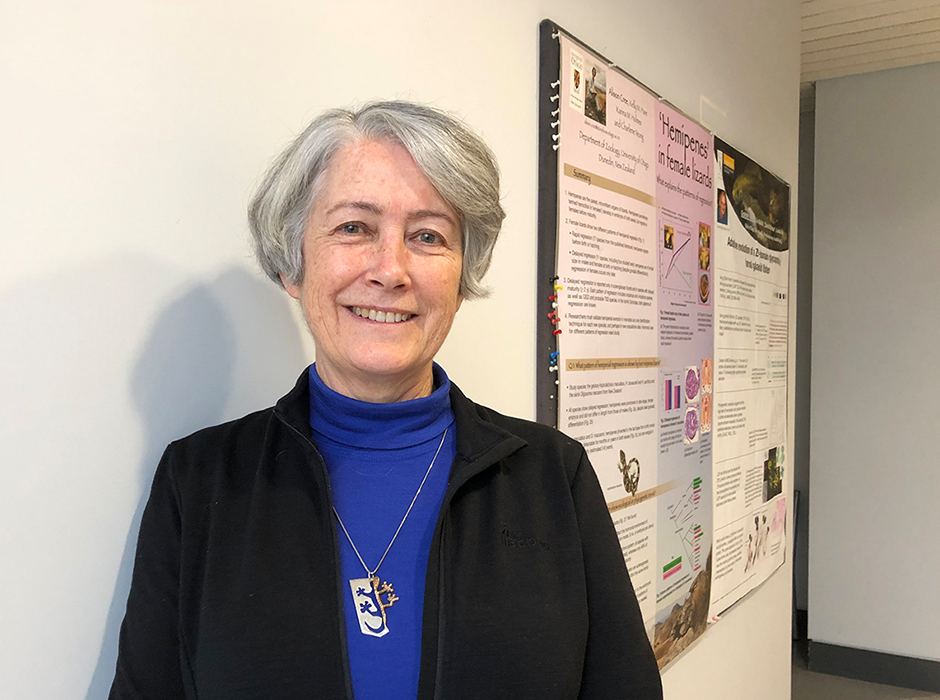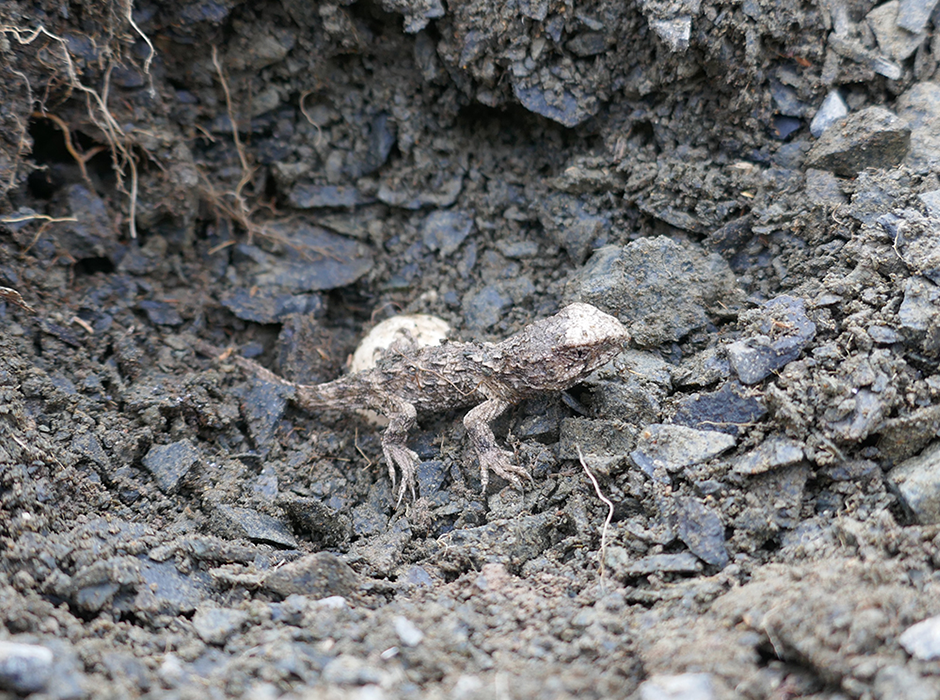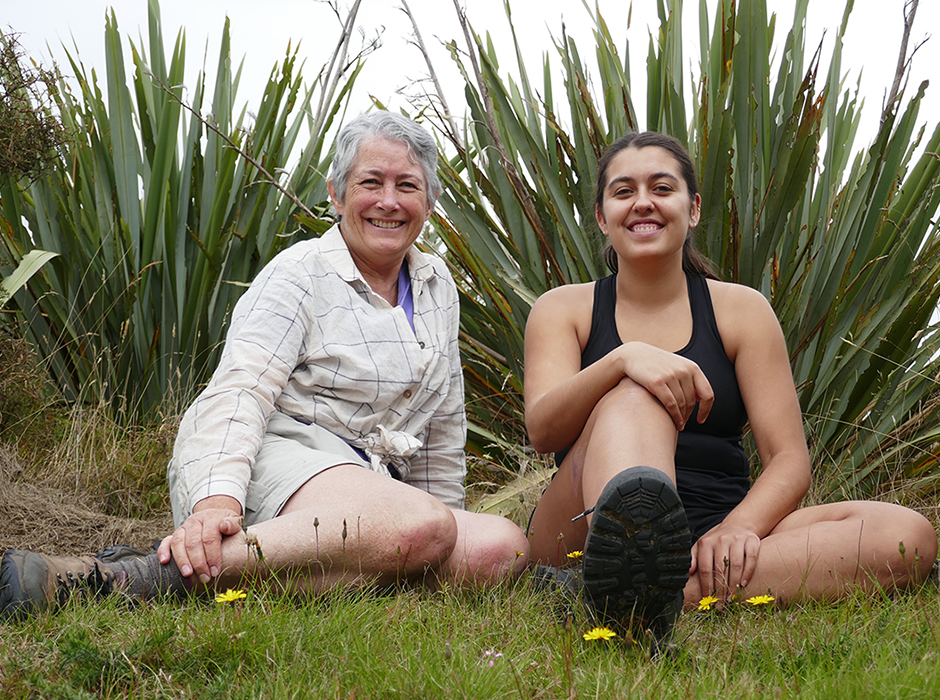
Zoologist and herpetology expert Emeritus Professor Alison Cree
Emeritus Professor Alison Cree’s move to Dunedin in 1991 was to fill a temporary one-year lecturer role in the Department of Zoology. That one year expanded into thirty, and over that time Professor Cree established herself as a leading expert on the reptiles of Aotearoa New Zealand, especially in their functional biology.
For over three decades, her work has made significant contributions to enhance conservation outcomes for herpetofauna and fundamentally advanced understanding of the reproductive biology of reptiles in temperate climates. It has also informed various reptile conservation and reintroduction programmes around the country.
Professor Cree retired in 2021, and in June this year, her contributions were recognised when she was named a Companion of the New Zealand Order of Merit for her services to herpetology, particularly the taonga tuatara.
Upon receiving news of the 2023 King’s Honour, Professor Cree says what struck her in the letter was a sentence to the effect of ‘you have served your country well’.
“That was quite an influential statement to read,” Professor Cree reflects. “It felt like a real validation of my efforts over the years, and as the recognition was coming from the wider community, it was very meaningful.”
However, while growing up and with many varied interests at the time of going to university, Professor Cree says her direction was initially uncertain. She just had a feeling, she recalls, that “it would probably be something working with animals”.
By the second year of studies at the University of Canterbury, Professor Cree was “getting a sense” that the field of New Zealand’s reptiles and amphibians could be interesting.
“I wrote an assignment that fascinated me. It led me to question the commonly held position that tuatara had existed as a species for 250 million years with no evolutionary change over that time – and similarly for our endemic leiopelmatid frogs. I began to develop some new perspectives that I thought I could offer to the subject.”
Following doctoral research at the University of Waikato on the frogs, Alison worked as a postdoctoral fellow at Victoria University of Wellington and then on contract to the Department of Conservation (DOC), mainly on the reproductive hormone cycles of tuatara on offshore islands. This work led to her contributing to DOC’s Tuatara Recovery Group and co-authoring the first Tuatara Recovery Plan.
Bringing together scientists, conservation managers, and the community, Professor Cree also helped found the Society for Research on Amphibians and Reptiles in New Zealand in 1987, with the vision to achieve research outcomes and projects to advance understanding and conservation of herpetofauna. Following her 34-year involvement with the Society, in 2021 she was elected to Honorary Life Membership.
Professor Cree’s research has explored the ecophysiology, including reproductive and thermal biology, of New Zealand skinks, geckos and the endemic tuatara. Her 30 years of service in Zoology included a period as Head of Department and achieving professorship in 2017.
Accompanying her move to the University of Otago in 1991, Professor Cree made the most of local research and conservation opportunities, including establishing an important connection with Orokonui Ecosantuary.
Drawing on her work with the Tuatara Recovery Group and translocation experience from Te Ika-a-Māui North Island, she worked with Orokonui and iwi guardians to transfer tuatara to the ecosanctuary and which linked to the national Tuatara Recovery Plan.

Tuatara hatchling with eggshell behind (photo: Alison Cree).
The project involved coordinating the transfer of tuatara from Cook Strait in 2012, in which Ngāti Koata escorted their taonga tuatara into the care of Kāti Huirapa Rūnaka ki Puketeraki of Kāi Tahu.
“At the core of the project and process was the necessity to develop relationships across all parties. We had begun that over the previous few years while some tuatara were held outdoors in captivity at Orokonui. This interim period had confirmed that the young tuatara would survive and grow in the outdoor environment.”
To date around 100 tuatara have been released at Orokonui with on-going monitoring taking place regularly. The ecosanctuary is notable as the southernmost wild population of tuatara, and the only known wild population on Te Waipounamu South Island.
Professor Cree documented her growing expertise and experience with the taonga species in a book she published in 2014 ‘Tuatara – biology and conservation of a venerable survivor’, which includes guidance on best-practice field protocol and captive-breeding guidelines for tuatara.
The book’s recognition of tuatara as taonga and the role of Māori as kaitiaki also speaks to one of Professor Cree’s career highlights.
“I have appreciated becoming better informed about Aotearoa’s human history and learning from the perspectives of Māori as kaitiaki and tangata whenua. This experience has been humbling, rewarding and an opportunity for growth.”
Within her department and as a member of the university’s Kaiāwhina Māori network, she has been instrumental in integrating the University’s Māori Strategic Framework into departmental practice.
Professor Cree now hopes the recognition in this year’s Kings Honours will increase awareness of Aotearoa New Zealand’s distinctive reptiles and amphibians and the people who care for them.
“There’s a community of people who take an interest in studying and protecting these species, including indigenous kaitiaki, conservation managers, ecosanctuary staff and fellow herpetologists, and I’ve enjoyed working with and being inspired by them all.”
While it’s still early days for the tuatara population at Orokonui, the first signs of reproduction have been positive and in 2021 included the first live sighting of hatching in the wild, a moment that was caught on camera by Otago researchers undertaking a routine inspection of a nest.
“It was a wonderful surprise to witness evidence of new tuatara life at the ecosanctuary, and in fact it’s very rare to see hatching happening anywhere in the wild.”

Professor Cree with Jade Christiansen, an undergraduate student in 2021 who observed the first live sighting of tuatara hatching at Orokonui while undertaking a routine nest inspection (photo: Alison Cree)
However, Professor Cree warns there’s still a long journey ahead and the huge pressures and challenges we are facing include reflecting on how we operate as a species on this planet.
“The big challenge for our species is to accept that transformation is necessary in how we live our lives. Are we going to leave a place that is habitable for the creatures that are our evolutionary kin to continue with the process of evolution?”
Professor Cree continues her mahi in the Zoology Department that includes writing up a “backlog of datasets” and contributing to research on the thermal ecology and reproduction of alpine lizards with Zoology colleague Dr Jo Monks.
As a member of an Orokonui advisory group helping with science and research aspects, she also continues to contribute to Orokonui Ecosanctuary.
Last year, marking the tenth anniversary of the first free-release of tuatara at Orokonui, Professor Cree joined the current monitoring team in assessing the status of the population.
“To date the tuatara have demonstrated resilience and are showing positive signs,” Professor Cree says. She adds however, that due to the tuatara’s long lifecycle, “it’s still early days and a self-sustaining population is not a done deal”.
But for Professor Cree, it was pleasing to see Dr Scott Jarvie, a former PhD student and now terrestrial ecologist for the Otago Regional Council, taking the lead role for the monitoring programme.
“Scott represents the new and next generation of scientists and conservationists who are leading the way forward. In general, zoologists of the future face new and mounting challenges and are needed more than ever – they deserve our support.”
Kōrero by Guy Frederick, Sciences Communications Adviser